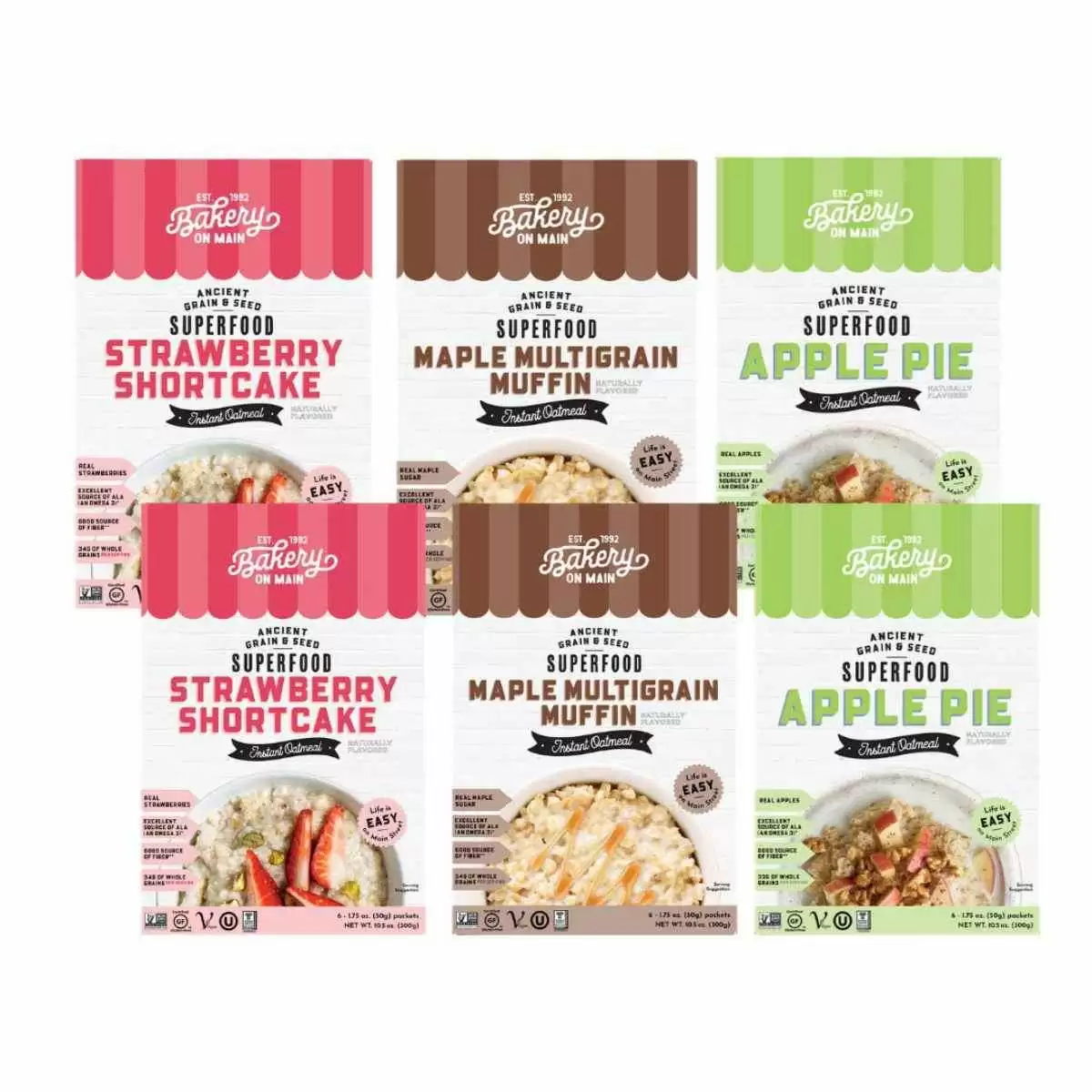
Celiac.com 01/21/2022 - Less than a decade ago in Chicago, there was a time when thousands of residents would have claimed that the best basketball team of all time was right here, right now. In the 1990’s, the combined magic of Michael Jordan, Scottie Pippen and the rest of that stellar Bulls team was, to a basketball fan, like nothing ever experienced in the past.
But then, there are those who would argue that a different team of the past (perhaps Larry Bird and the Boston Celtics, or Magic Johnson & Kareem Abdul Jabar of the Los Angeles Lakers) was the best ever. And, there are statistics, personal experience and memories of games played to validate each position—everyone was right within their own world of experience.
Celiac.com Sponsor (A12):
For an individual with celiac disease (often incorrectly referred to as “an allergy to wheat and gluten products”), there are several factors to consider in determining if oats is a safe food. The questions which are commonly asked by patients with known wheat or gluten sensitivity include:
- Oats are not a wheat product. Are oats safe for me to eat?
- Can oats have gluten?
- My Doctor says that oats are Ok, but I’ve read conflicting reports that say oats are to be avoided. Which is true?
As with ‘the greatest basketball team of all time’, the answer depends on your point of view. You can easily find doctors and researchers who will offer evidence on both sides of these questions. Here’s the latest information to help you in answering these questions for yourself.
There are three factors to be addressed:
- Is there gluten in oats?
- Can oats trigger a gluten-type sensitivity reaction?
- Is there anything else in oats that can be offensive?
Let’s consider these factors one at a time. First, is there gluten in oats? The clear and uncontested answer is no, there is no gluten in oats— and, yes, there is gluten in oats.
Confused? Here’s why: gluten is the offensive prolamin (simple protein found in seeds) protein found in wheat. It is known to be one of the triggers to the symptoms of celiac disease. Avenin is the prolamin protein of oats. It has a different chemical structure than gluten and avenins have been predicted to contain only a few glutamines that can be deaminated by tissue transglutaminase, presumably making avenins less immunogenic thus substantially less offensive to the lining of the intestines than gluten(15,16). The offensive protein in oats is not gluten. So, no, there is no gluten in oats.
And now to the yes answer regarding the gluten content of oats. In a recent study entitled ‘Gluten Contamination of Commercial Oat Products in the United States’, the author purchased 12 containers of rolled or steel-cut oats representing four different lots of each of three different brands between October 2003 and March 2004(14). The three brands were Quaker (processed in Chicago—selected because it is a popular brand of oatmeal in the U.S.), Country Choice (Eden Prairie, Minnesota—because it is certified to be organic) and McCann’s (Odlum Group, Nass, Ireland, because it is processed in an oats-only facility).
Following the Codex limit for naturally occurring gluten-free foods, oat samples were considered gluten-free if they contained 20 parts per million (20 ppm) or less of gluten17. The results were startling. All three brands of oats had gluten contamination above 20 ppm in at least two of the four samples tested. Ranges of gluten in the four samples from the 3 different companies ranged from:
- McCann’s, none to 725 ppm;
- Country Choice, none to 210 ppm; and
- Quaker, 338 to 1807 ppm.
Even the best of the three (Country Choice) was 10 times above the safe limit of gluten contamination, and the worst was 90 times above the limit. So, even though oats are not composed of gluten, it appears that oats contain gluten more than half the time—and the amount of gluten present is often dangerously high for someone with Celiac Disease. So, you are asking: Where does the gluten in oats come from? The author of the study wrote:
“Celiac organizations across the United States continue to advise against the consumption of oats because of concerns that commercial oat products may be contaminated with wheat, barley, or rye during harvesting, transporting, milling and processing.”(18)
Can Oats Trigger a Gluten-type Sensitivity Reaction?
Once again, there are two answers. On one hand, if oats are contaminated with gluten at dangerously high levels more than half the time, the answer would have to be ‘yes, oats can trigger a gluten-type sensitivity reaction.
Basically if you are following a strict gluten-free diet, doing very well at food selections, AND eating oats (‘because there is no gluten in oats’), you could still develop celiac disease complications.
We know that celiac disease is a chronic inflammatory immune response in the intestines and other tissues due to gluten exposure(1) . Is it safe to eat oats on a gluten-free diet? Given the above information, it is likely not safe for celiac patients to eat oats or oat products.
Can oats trigger a gluten-type sensitivity reaction? The second answer has to do with the composition of oats. Due to the protein in oats (avenin) having such a different chemical structure, it has been predicted to be much less offensive to the immune system making oats less immunogenic (immune system stimulating)(2,3). There have also been a number of studies that have suggested oats do not trigger the same type of immune response as gluten(4-11).
However, there have been studies on the other side of the coin that identify an immune response of some type. A recent study of 39 Finnish patients randomized to eat a gluten-free diet with 50 grams of oats daily or a standard gluten-free diet for one year reported more intestinal symptoms and more gut inflammation in the group of patients eating oats(13).
The researchers wanted to find out why this was happening to some celiac patients. When searching for the mechanism that was causing an oat-sensitivity reaction for some celiacs they discovered a similar-to-gluten type of immune system response in the intestines. They described this as:
“We established oats-avenin-specific and - reactive intestinal T-cell lines from these three patients, as well as from two other patients who appeared to tolerate oats. The avenin-reactive T-cell lines recognized avenin peptides in the context of HLA-DQ2. These peptides have sequences rich in proline and glutamine residues closely resembling wheat gluten epitopes. Deamidation (glutamine/glutamic acid conversion) by tissue transglutaminase was involved in the avenin epitope formation.”
We conclude that some celiac disease patients have avenin-reactive mucosal T-cells that can cause mucosal inflammation. Oat intolerance may be a reason for villous atrophy and inflammation in patients with celiac disease who are eating oats but otherwise are adhering to a strict gluten-free diet. Clinical follow-up of celiac disease patients eating oats is advisable.” (12)
Summary
Although technically there is no gluten in oats, and celiac disease is associated with gluten exposure, it is a roll of the dice for celiac patients to eat oats for two reasons:
- Given the frequency of contamination of oats with gluten, it is impossible to be assured of a gluten-free oat product.
- Some celiac patients (and as of yet it is impossible to know which ones), appear to have an immune system sensitivity reaction to oats similar to gluten.
Thus the safest approach at this point may be to include elimination of oats to a gluten-free diet, allow the intestines to heal (and have that documented with a recheck endoscopic exam), then do an oat-challenge diet and regularly recheck via endoscope for any signs of intestinal damage. This is a timely process (and a nuisance for the patient), but if one wants to eat oats this may be the only way to do it safely.
References:
- Sollid LM (2002) Coeliac disease: Dissecting a complex inflammatory disorder. Nat Rev Immunol 2: 647–655.
- Vader LW, de Ru A, van Der WY, Kooy YM, Benckhuijsen W, et al. (2002), Specificity of tissue transglutaminase explains cereal toxicity in celiac disease. J Exp Med 195: 643–649.
- Piper JL, Gray GM, Khosla C (2002) High selectivity of human tissue transglutaminase for immunoactive gliadin peptides: Implications for celiac sprue. Biochemistry 41: 386–393.
- Janatuinen EK, Pikkarainen PH, Kemppainen TA, Kosma VM, Jarvinen RM, et al. (1995) A comparison of diets with and without oats in adults with celiac disease. N Engl J Med 333: 1033–1037.
- Srinivasan U, Leonard N, Jones E, Kasarda DD, Weir DG, et al. (1996) Absence of oats toxicity in adult coeliac disease. BMJ 313: 1300–1301.
- Hardman CM, Garioch JJ, Leonard JN, Thomas HJ, Walker MM, et al. (1997) Absence of toxicity of oats in patients with dermatitis herpetiformis. N Engl J Med 337: 1884–1887.
- Reunala T, Collin P, Holm K, Pikkarainen P, Miettinen A, et al. (1998) Tolerance to oats in dermatitis herpetiformis. Gut 43: 490–493.
- Hoffenberg EJ, Haas J, Drescher A, Barnhurst R, Osberg I, et al. (2000) A trial of oats in children with newly diagnosed celiac disease. J Pediatr 137: 361–366.
- Janatuinen EK, Kemppainen TA, Julkunen RJ, Kosma VM, Maki M, et al.(2002) No harm from five year ingestion of oats in coeliac disease. Gut 50:332–335.
- Størsrud S, Olsson M, Arvidsson LR, Nilsson LA, Nilsson O, et al. (2003),Adult coeliac patients do tolerate large amounts of oats. Eur J Clin Nutr 57:163–169.
- Ho¨ gberg L, Laurin P, Fa¨ lth-Magnusson K, Grant C, Grodzinsky E, et al.(2004) Oats to children with newly diagnosed coeliac disease: A randomized double blind study. Gut 53: 649–654.
- Helene Arentz-Hansen1, Burkhard Fleckenstein1,2, Øyvind Molberg1, Helge Scott3, Frits Koning4, Gunther Jung5, Peter Roepstorff2, Knut E. A. Lundin1,6, Ludvig M. Sollid1*, The Molecular Basis for Oat Intolerance in Patients with Celiac Disease, PLoS Medicine, http://www.plosmedicine.org, October 2004, Volume 1, Issue.
- Pera¨ aho M, Kaukinen K, Mustalahti K, Vuolteenaho N, Ma¨ ki M, et al. (2004) Effect of an oats-containing gluten-free diet on symptoms and quality of life in coeliac disease. A randomized study. Scand J Gastroenterol 39: 27–31.
- Thompson,T., Gluten Contamination of Commercial Oat Products in the United States, NEJM,Nov.4,2004,2021-22.
- Vader LW, de Ru A, van Der WY, Kooy YM, Benckhuijsen W, et al. (2002) Specificity of tissue transglutaminase explains cereal toxicity in celiac disease. J Exp Med 195: 643–649.
- Piper JL, Gray GM, Khosla C (2002) High selectivity of human tissue transglutaminase for immunoactive gliadin peptides: Implications for celiac sprue. Biochemistry 41: 386–393.
- Joint FAO/WHO Food Standards Program, Codex Committee on Nutrition and Foods for Special Dietary Uses. Draft revised standard for gluten-free foods. CX/NFSDU 98/4 July 1998: 1-4, http://intlspectrum.diabetesjournals.o rg/cgi/content/full/15/3/197.
- Thompson,T. Oats and the Gluten-Free Diet, J Am Diet Assoc. 2003;103,876-9.










Recommended Comments
Create an account or sign in to comment
You need to be a member in order to leave a comment
Create an account
Sign up for a new account in our community. It's easy!
Register a new accountSign in
Already have an account? Sign in here.
Sign In Now